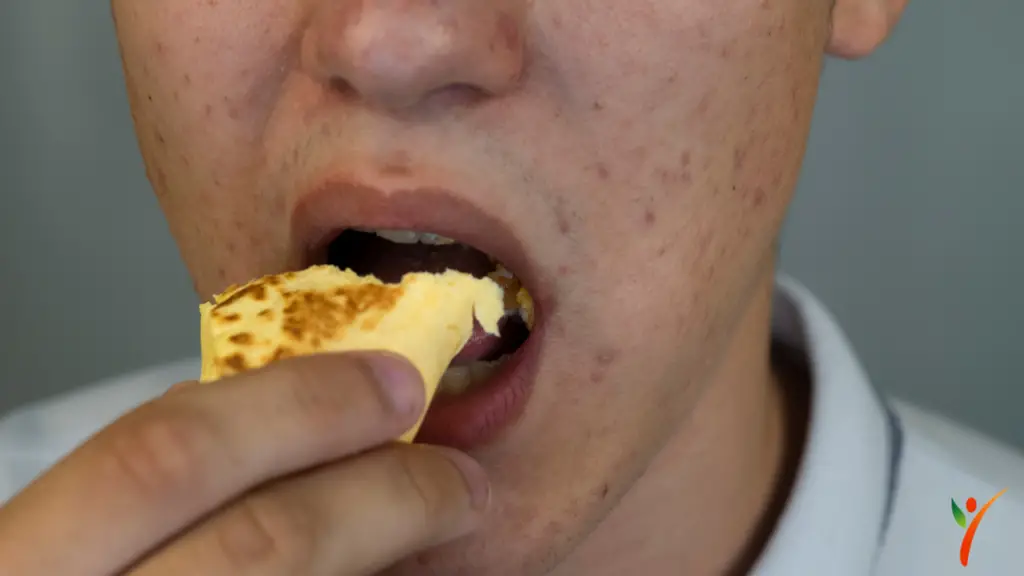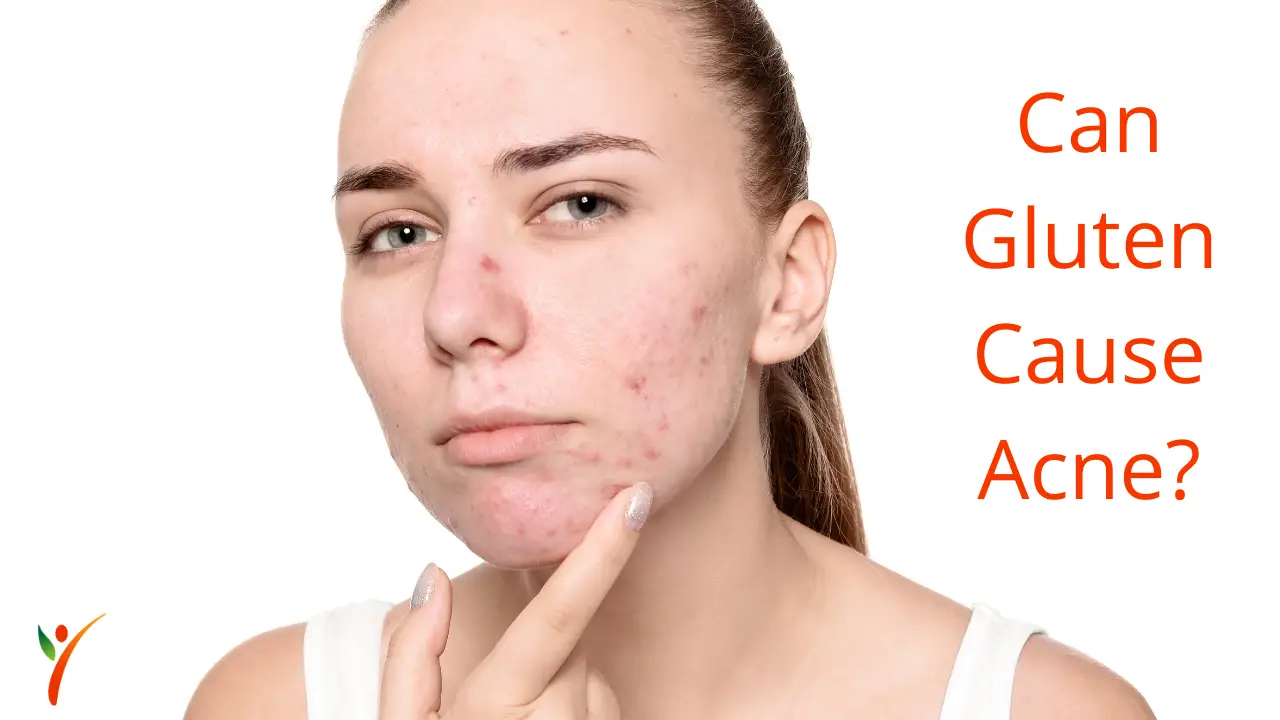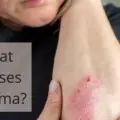Have you long suffered constant acne breakouts? Or do you find your skin becoming even more prone to acne than before? Apart from other factors like medicines, pollution, etc., the reason for this may also be your eating habits and whatever you consume.
If you have been a heavy wheat consumer, the reason behind your acne probably lies in your diet.
There has been researching done on the relationship between gluten and acne. And to understand this gluten and acne relationship, we need to start by knowing how gluten causes acne.
How Does Gluten Cause Acne?

The great discussion on what causes skin breakouts and the gluten and acne connection is still in progress.
- Some state that these could be obstructed pores; others swear it is food, while many accept hormones are at fault.
Any of these can add to skin inflammation leading to acne.
- However, one thing we know to be true is that you should not limit what you eat. Before doing so, it is better to consult a professional if you feel that it affects your skin.
- We want to offer the possibility that regardless of whether gluten is or not causing your skin break out, it may be worsening an already existing acne condition because of a bit of something many refer to as Gliadin.
More About Gliadin
Gliadin is a segment of gluten, and one can find it in wheat and different grains. It is the main offender behind celiac ailment: the proteins actuate the disorder, and the body reacts through insensitivity and release of Gliadin (and thus, gluten).
This function's response is generally irritating in the body, particularly in the more affected area, the acne-prone one.
- Pain in one organ or territory of the body triggers irritation elsewhere in the body. In turn, it turns out to be generally evident in the skin.
- According to the latest studies, the more significant part of all skin break out victims has gut issues.
- Stomach related conditions like celiac infection go under skin signs. These signs possibly resolve when the fundamental irritation is no longer there.
- Most importantly, aggravation causes a disturbance.
- Any item regarded provocative, regardless of whether it goes straightforwardly on the skin or even if you ingest it, you should avoid if you need to abstain from exacerbating skin issues.
- In case you are sensitive to gluten and expend it in any case, you are putting yourself in danger for a kindled small digestive system as well as inflammation and bothered skin.
Albeit, a few people with terrible skin break out—especially cystic skin inflammation, have detailed that their skin improved once they started following the sans gluten diet.
But to answer how gluten causes acne, there is no clinical proof showing gluten can cause acne. There is likewise no clinical proof demonstrating that a gluten-free diet helps with acne.
Does Eating A Gluten-Free Diet Help With Acne?

Some individuals accept that the gluten-free diet helped them with their acne issues. It is entirely conceivable that individuals with celiac infection or non-celiac gluten affectability may see their skin become clearer; once they go sans gluten. However, it would not be because the gluten protein initially causes skin inflammation (which it does not).
Likewise, it is conceivable that somebody who does not have celiac or gluten affectability may see an improvement in their skin inflammation by going sans gluten; however, for reasons that have nothing to do with their eating routine's gluten content. Let us delve deeper into understanding what science says about the trio: celiac ailment, a gluten-free diet, and skin break out.
Gluten and Acne Research

Doubtlessly that celiac ailment and non-celiac gluten affectability have been connected to various skin conditions. It includes the bothersome rash dermatitis herpetiformis, the interminable skin condition dermatitis. The immune system skin condition psoriasis, and ceaseless hives, which frequently are diagnosed with hypersensitivities, are also included.
Nonetheless, there aren't any reports in the clinical writing of celiac or gluten affectability, which shows that it connects to skin break out.
That does not mean a connection between these gluten-related conditions and skin inflammation is preposterous. It implies clinicians have not studied and succeeded in finding anything about the same yet.
- Various episodic stories from individuals determined to have celiac sickness or gluten affectability who saw their skin inflammation improve once they started eating gluten-free.
- So, what could be going on in these cases?
One chance is that somebody who has a skin condition that connects to celiac and gluten affectability. For example, dermatitis or hives—may see a general improvement once that individual is determined to have the gluten-related condition and starts following a gluten-free diet.
Analysis Of A Proper Diet For Acne
Curiously, an eating regimen heavy on meat consumption may raise your odds of creating skin break out through a mind-boggling chain response.
- There is a protein-complex inside the human body that a few analysts accept is liable for turning on this chain response that invigorates the skin's oil organs and makes skin inflammation breakouts bound to create.
- The trigger to kick this cycle off is the corrosive Amino Leucine. Nourishments like meat and chicken are generally high in Leucine.
- Up until now, there isn't any conclusive verification, as this is only a hypothesis. Be that as it may, it is an intriguing glance at how the skin functions.
- It is unquestionably conceivable that somebody with one of those skin issues may confuse it with skin inflammation.
It is also possible that an individual could have both skin inflammation and another skin condition simultaneously, muddling the conclusion even further.
Gluten-Free Diet and Acne

Another motivation behind why a few people may see the gluten-free diet to be useful with their skin inflammation: There is some proof that a low-glycemic diet could help improve skin inflammation.
On the off chance that somebody begins a sans gluten diet that is likewise lower on the glycemic file, at that point that gluten-free/ low- glycemic list diet may support their acne improvement and do some good.
- Nourishments position the glycemic record by how they sway your glucose level.
- Nourishments higher on the glycemic list assimilate quicker in your stomach system and therefore make your glucose rise fall more rapidly. In contrast, nourishments that are lower on the list do not have as incredible an effect on your glucose level.
- The examination has indicated that low-glycemic record nourishments can help individuals with diabetes monitor their condition.
- Studies have found that individuals following a low-glycemic diet saw their skin inflammation and acne improve when contrasted with individuals who did not follow the low-glycemic diet.
- It is conceivable that decreasing spikes in glucose can help adjust the hormones thought to have involvement in skin inflammation development.
However, how does this identity with the gluten-free diet and skin inflammation reports and other skin upgrades?
When you roll out a critical improvement in your eating routine, for example, going gluten-free, you will have to take out numerous nutrients; maybe including high-glycemic alternatives, such as exceptionally processed desserts and bread items.
You additionally may end up cooking at home more regularly.
What Does Sans Gluten Do?

Indeed, sans gluten, abstains from food that is frequently low in numerous significant supplements, including calcium, nutrient B12, fiber, iron folate, zinc, niacin, and phosphorous.
Leading to exacerbate your skin inflammation, given that supplements, for example, zinc can help forestall skin inflammation.
This impact is a long way from a slam dunk. Numerous individuals who move to a san's gluten diet consume higher sugar and rice flour; which are both high-glycemic list fixings.
Just a couple of gluten-free bread brands contain entire grains. Your local supermarket may not convey a higher-fiber assortment (all grains are lower on the glycemic list).
So, suppose you go without gluten yet wind up eating loads of exceptionally refined rice flour or going after bundles of sans gluten treats and candy. In that case, you are probably not going to find that it improves your skin inflammation.
If the without gluten/low-glycemic file diet does, in certainty, help with your skin acne, it is not because you have killed gluten consumption in your body. Instead, this is because you have wiped out spikes in your glucose.
How Can You Improve Your Acne Condition?
Now that you know how gluten causes acne or is related to the aggravation or bettering of it; you also need to follow some tips that will surely come in handy to help with your acne conditions. It will also provide you some relief.
One can trace issues such as excessive swelling, stomach related problems, weariness, and skin flare-ups, back to gluten consumption. However, do not expect that gluten is the leading solution to your skin issues. Rather than putting all your skin problems in a single gluten bin, it would help if you tried an elimination diet to recognize triggers.
Supportive Tips To Help Against Acne:
- Make a broad rundown of what you will eat during your elimination diet. You will be propelled and ceased from getting exhausted by the cycle.
- Record all the nourishments you will be evading. Concentrate on things that connect to skin issues: gluten, sugar, dairy, liquor.
- Ensure that you are getting adequate supplements — in case you are deficient, it could tamper the result.
- Show restraint. Try not to give up even if three days have passed by, and you have not seen any substantial outcome. Your body needs an ideal opportunity to alter.
- Use skin products and cosmetics that are exclusively gluten-free. Many skin care products also use gluten in their manufacturing; due to gluten being a binding product that holds the components together. Check for your product labels and ensure they mention gluten-free on them. The products you use on your face is equally as important as to what you are eating.
Gluten And Acne; The Truth Up Until Now

In case you are looking for an answer for your relentless skin break out issues; it may be enticing to go without gluten. Individuals have been responding that it has restored everything from obstinate midsection fat to infertility and stress, as well as anxieties.
Yet, before you begin going gluten-free, we should take a gander at the realities. There is almost no concrete proof that dispensing gluten clears up skin in individuals; who do not experience the ill effects of celiac infection or gluten sensitivities.
Likewise, there is no proof to back up the case that skin inflammation is an indication of gluten intolerance, regardless of individuals asserting it to be valid. Skin inflammation and acne can be a disappointing, hard-to-treat condition, as it's justifiable that somebody with an awful instance of skin breaks out would search for a dietary fix.
Eating just natural nourishments won't help treat your skin inflammation. Scientists have found, there is some proof that green tea may help with skin inflammation.
Conclusion
Could dumping gluten help you shed pounds, improve mental concentration, clear up acne, and get healthy skin and feel better as a rule?
Well, maybe? In an ongoing report, analysts inferred that most affected individuals revealed feeling better on a gluten-free diet. Nonetheless, more examination is needed to comprehend the connection ultimately; between gluten and without wheat diets and sentiments of improved prosperity.
Skin break out advancement is exceptionally intricate. It is profoundly improbable that simply transforming one part of your eating regimen will clear up an instance of skin inflammation.
Continue to eat well and see if your skin continues to improve. It is essential to look at the diet you eat and how your body is reacting.
Live Extraordinarily!





